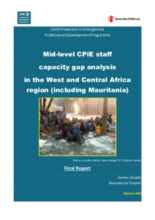Conflict (including terrorist attacks) and displacement/forced displacement (to temporary sites or camps deprived of basic services) are the main factors shaping the political context of this region. The security situation is also undermined by the presence of terrorist groups.
Several countries in the region are further disaster-prone (such as is the case in DRC, Liberia, CAR) and subject to serious consequences of climate change on the environment and people’s livelihood. Besides, a sub-set of countries in the region have been or still are affected by the Ebola epidemics (Sierra Leone, Liberia, DRC for example), that has further compounded this already complex political and environmental regional context.
The main challenge encountered by child protection in emergencies (CPiE) practitioners in applying CP programmatic approaches appears to be the lack of knowledge (of CP tools, standards, systems) hence an accrued need for capacity building for CPiE actors, from NGOs and Government institutions alike. Further obstacles are posed by lack of funding and insufficient community empowerment/recognition. Lack of coordination, cultural beliefs and weak family structures (such as lack of parental skills) are amongst other mentioned challenges that make the implementation of CP programmatic approaches difficult in this region.
The CPiE capacity gaps analysis (CGA) in the West and Central Africa (plus Mauritania) region, targeting CPiE practitioners with 3-5 years of professional experience, has been conducted by independent consultants Serena Zanella and Manuela De Gaspari, during the period November 2019-February 2020. The overall objective of the CGA has been to collect and provide information on:
➢ Identified key CPiE capacity gaps.
➢ Existing and available capacity building initiatives.
This report identifies three top CPiE issues affecting children in the conflict-ridden and displacement-pervaded context of West and Central Africa (including Mauritania):
➔ All forms of violence (including sexual violence (SGBV), abuse and exploitation)
➔ Unaccompanied separated children and family reunification
➔ Children associated with armed forces or groups and their reintegration
The report concludes with recommendations for capacity-building for CPiE staff in the region.

